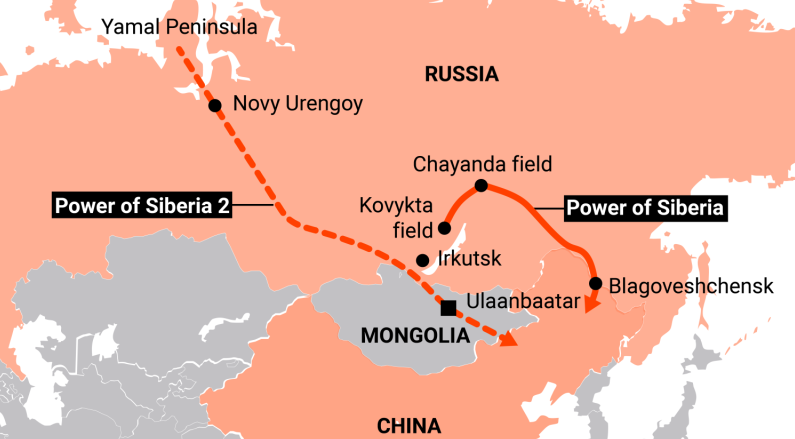Power of Siberia 2 Deal
Context: The announcement of a “legally binding” deal on the Power of Siberia 2 gas pipeline during Russian President Vladimir Putin’s state visit to China marks a significant milestone in the deepening partnership between Moscow and Beijing.

What is the Power of Siberia 2 gas deal?
The Power of Siberia 2 is a massive natural gas pipeline project that would transport gas from Russia’s vast reserves in Western Siberia through Mongolia to China. This distinguishes it from the original Power of Siberia 1 pipeline, which connects gas fields in Eastern Siberia directly to China.
- Strategic Importance for Russia: This pipeline provides a crucial alternative market to Europe (disrupted after the Ukraine War), allowing Russia to monetise its stranded gas reserves and maintain its fiscal health.
- Strategic Importance for China: It offers a new, land-based route for energy imports, diversifying away from seaborne Liquefied Natural Gas (LNG) shipments that are vulnerable to maritime chokepoints and price volatility. It strengthens China’s energy security and gives it significant leverage in price negotiations with other suppliers.
- Mongolian Factor: Mongolia, a landlocked country, stands to benefit from transit fees and increased geopolitical relevance, though it also risks becoming further economically dependent on both neighbors.
How is it going to change global energy security?
The Power of Siberia 2 deal will accelerate the fragmentation of the global energy market into distinct, politicised blocs, moving away from a more unified, market-driven system.
- Creation of a Eurasia Energy Bloc: The pipeline will tightly bind the energy interests of Russia (the supplier), China (the consumer), and Mongolia (the transit state), creating a Moscow-Beijing axis.
- Reduced Leverage for Europe: Europe’s ability to use its market power to dictate terms or impose costs on Russia will diminish as Moscow successfully pivots eastward.
- China’s Strengthened Hand: China gains a powerful tool to pressure other gas suppliers (e.g., Turkmenistan, LNG exporters like Qatar and Australia) to offer more competitive prices, knowing it has a large, reliable alternative in Russia.
The Falin Doctrine
It was named after Valentin Falin, a senior Soviet diplomat and expert on Germany. The doctrine argues that Russia should use its vast energy resources not just as an economic tool, but as a primary instrument of geopolitical leverage. It posits that by controlling energy supplies to Europe, Russia can create divisions within NATO and the EU, influence political decisions, and ensure European neutrality or acquiescence to Russian strategic interests. Power of Siberia 2 represents its adaptation to the East. Russia is now applying the same logic of using energy as a strategic weapon to bind China in a long-term relationship, making Beijing a de facto partner and reducing its options to oppose Russian actions globally.
How is it going to affect India’s national interest?
The deepening Russia-China energy partnership presents a complex challenge for India’s national interests, with both negative implications and potential opportunities.
- Challenges and Threats:
- Strengthened Russia-China Axis: It could limit Russia’s ability to remain a neutral partner for India and make it more susceptible to Chinese pressure regarding issues like arms sales or diplomatic support on matters like Kashmir.
- Impact on India’s Energy Security: If China satisfies more of its gas demand through this cheap pipeline gas, it could free up Chinese capital to aggressively outbid India for LNG cargoes on the spot market, potentially driving up prices for India.
- Diminishing Russian Leverage: Russia’s growing dependence on China reduces its utility for India as an independent, balancing power in a multipolar world order.
- Potential Opportunities:
- Re-evaluation of IPI Pipeline: The success of this pipeline might renew Chinese and Russian interest (investment) in the long-stalled Iran-Pakistan-India (IPI) gas pipeline.
